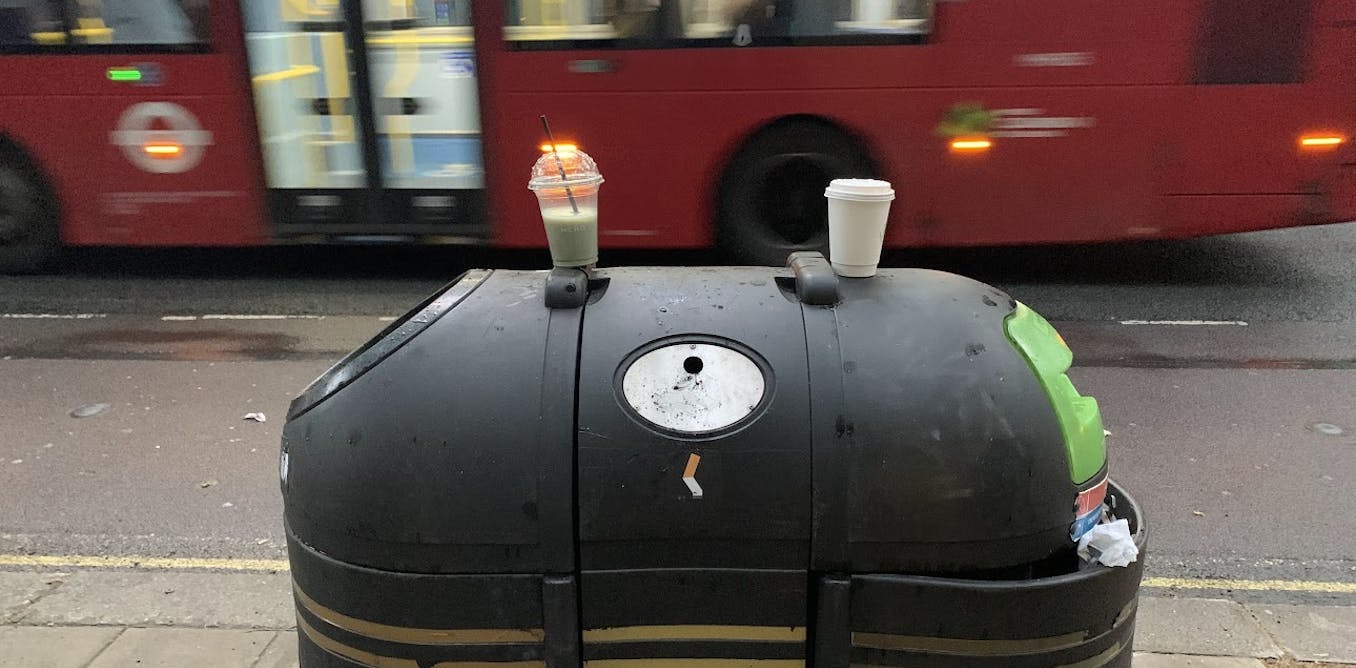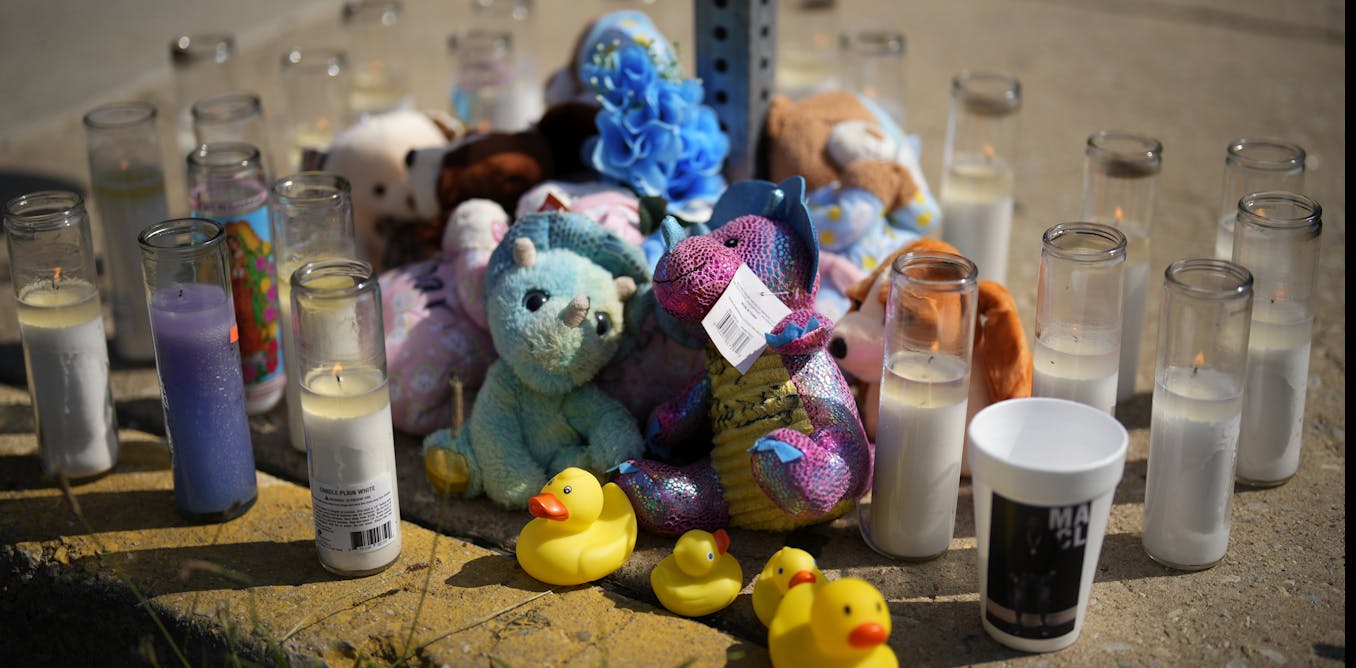-
'Polite littering' is a rubbish problem - here's why the British approach to tackling clean ups is not working
 Since moving to London almost a decade ago, I’ve always been struck by the drink tins, sandwich packs and free newspapers draped on and wedged in every nook and cranny of this beautiful city.
Since moving to London almost a decade ago, I’ve always been struck by the drink tins, sandwich packs and free newspapers draped on and wedged in every nook and cranny of this beautiful city.
I’ve coined the phrase “polite littering” to represent rubbish that has been left like this, without people even realising they’re littering. This could be why communications that ask people not to litter when they don’t know they are littering, are simply ineffective, and can discredit the efforts of people cleaning up our public spaces.
Continued here -
TikTok users claim freezing bread can make it healthier - here's what the science actually says
 Lead for Evidence-Based Medicine and Nutrition, Aston Medical School, Aston University
Lead for Evidence-Based Medicine and Nutrition, Aston Medical School, Aston University
The science behind it is actually sound, albeit a little confusing. But the actual health effects are not nearly as significant as they’ve been made out to be.
Continued here -
Purple Hibiscus: Ibrahim Mahama's Barbican installation wraps the brutalist building in bright cloth and reveals a hidden history
 The Barbican recently unveiled Purple Hibiscus, a new textile installation by Ghanaian artist, Ibrahim Mahama. Named after Nigerian writer Chimamanda Ngozi Adichie’s 2003 novel, the colourful installation comprises 2,000 square metres of handwoven cloth covering the Barbican’s Lakeside Terrace.
The Barbican recently unveiled Purple Hibiscus, a new textile installation by Ghanaian artist, Ibrahim Mahama. Named after Nigerian writer Chimamanda Ngozi Adichie’s 2003 novel, the colourful installation comprises 2,000 square metres of handwoven cloth covering the Barbican’s Lakeside Terrace.
I visited the installation on a cold, windy morning. The bright pink fabric swaying gently in the wind stood in stark contrast to the grey tones of the brutalist architectural complex. However, the visual contrast between the artwork and the building’s concrete façade hides a strong connection.
Continued here -
Liz Truss's lessons on how not to be a prime minister
 All prime ministerial memoirs are about shaping legacies. “History will be kind to me,” Churchill is alleged to have said before writing his own six-volume history. “For I intend to write it.”
All prime ministerial memoirs are about shaping legacies. “History will be kind to me,” Churchill is alleged to have said before writing his own six-volume history. “For I intend to write it.”
But among these memoir writers sits a sub-genre of leaders who need to do some pretty serious legacy shaping. Think Anthony Eden on Suez, Margaret Thatcher on the poll tax, Tony Blair on Iraq or David Cameron on Brexit.
Continued here -
Focus on Rwanda's safety is a distraction from the dangerous conditions for asylum seekers in the UK
 Five months ago, the UK’s Supreme Court ruled that the plan to send asylum seekers to Rwanda was unlawful. The court found the African country was “unsafe” under international law on refugee protection.
Five months ago, the UK’s Supreme Court ruled that the plan to send asylum seekers to Rwanda was unlawful. The court found the African country was “unsafe” under international law on refugee protection.
The UK government, rather than changing the plan, has just passed a new law to declare that Rwanda is safe. This is not just a farcical legal workaround, it is deeply ironic given the unsafe conditions for asylum seekers in the UK. And, it is dangerous for the wider legal and political system when the government forces through legislation to overturn legal decisions that it does not like, making us all less safe.
Continued here -
Think you'll never retire? Here are four things young people can do to prepare
 Retirement planning sounds about as exciting as watching paint dry, especially when you’re in your 20s. But it’s actually the key to unlocking your future freedom. The earlier you start saving, the more time your money will have to grow. And you need to have a plan for how much you need to save and how you’re going to do it.
Retirement planning sounds about as exciting as watching paint dry, especially when you’re in your 20s. But it’s actually the key to unlocking your future freedom. The earlier you start saving, the more time your money will have to grow. And you need to have a plan for how much you need to save and how you’re going to do it.
Unfortunately, retirement planning is often something that’s overlooked, even by people in their late 40s. And even if they want to start planning, they may find the idea of it overwhelming or be unsure where to start.
Continued here -
Philadelphia has a lot more deadly shootings than expected for a big city - and NYC is much safer, new study says
 Recent high-profile mass shootings at SEPTA bus stations have left Philadelphia commuters on high alert. Two gunmen opened fire at a bus stop in the Ogontz neighborhood on March 4, 2024, striking five people and killing 17-year-old Dayemen Taylor. Two days later, a group of teenagers shot eight other teens waiting at a bus stop near Northeast High School after school.
Recent high-profile mass shootings at SEPTA bus stations have left Philadelphia commuters on high alert. Two gunmen opened fire at a bus stop in the Ogontz neighborhood on March 4, 2024, striking five people and killing 17-year-old Dayemen Taylor. Two days later, a group of teenagers shot eight other teens waiting at a bus stop near Northeast High School after school.
So far in 2024, 86 people have been killed in Philadelphia – the vast majority of them after being shot. And yet, the city is still on track to have the lowest number of homicides since 2016, a sign of just how violent it has been in past years.
Continued here -
Cybersecurity researchers spotlight a new ransomware threat - be careful where you upload files
 You probably know better than to click on links that download unknown files onto your computer. It turns out that uploading files can get you into trouble, too.
You probably know better than to click on links that download unknown files onto your computer. It turns out that uploading files can get you into trouble, too.
Today’s web browsers are much more powerful than earlier generations of browsers. They’re able to manipulate data within both the browser and the computer’s local file system. Users can send and receive email, listen to music or watch a movie within a browser with the click of a button.
Continued here -
Under the influence and under arrest - what happens if you're drunk in the interrogation room?
 Imagine it’s Friday night. You’re enjoying happy hour with friends after a long week. You’re relaxed, having indulged in several of your preferred adult beverages. Now imagine that as you leave the bar, a police officer approaches. You’re under arrest.
Imagine it’s Friday night. You’re enjoying happy hour with friends after a long week. You’re relaxed, having indulged in several of your preferred adult beverages. Now imagine that as you leave the bar, a police officer approaches. You’re under arrest.
Flash forward to the police station. The officer takes you to a cramped room and reads you your Miranda rights: You have the right to remain silent, to an attorney, and all the rest. Let’s say you waive those rights – most people do – and the officer questions you for several hours.
Continued here -
Trust in the shadows: How loyalty fuels illicit economic transactions
 When you think about economic activities that society tends to frown on – like offering bribes, paying for the services of a sex worker or even selling human organs – “trust” and “loyalty” might not be the first things that come to mind. But these seemingly positive characteristics play a key role in letting people disguise illicit transactions as something more socially acceptable, my colleague Gabriel Rossman and I recently found in a series of experiments.
When you think about economic activities that society tends to frown on – like offering bribes, paying for the services of a sex worker or even selling human organs – “trust” and “loyalty” might not be the first things that come to mind. But these seemingly positive characteristics play a key role in letting people disguise illicit transactions as something more socially acceptable, my colleague Gabriel Rossman and I recently found in a series of experiments.
As a professor of management who leads the University of Arizona’s Center for Trust Studies, I’ve long been interested in how people conceal illicit economic activity. One important way is through what scholars call “obfuscation” – hiding the true nature of an exchange to avoid social judgment or legal scrutiny. For example, a person who wants to hire a sex worker may disguise their payment as a more socially acceptable “gift,” while someone who wants to bribe a politician may instead make a “campaign contribution.”
Continued here
Friday 26th April 2024
Top stories this week